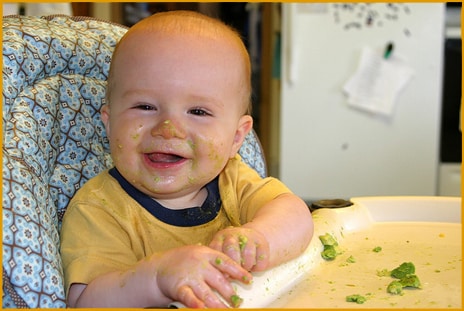
For just a little while, it seemed as if questions about the relationship between breastfeeding and childhood obesity might have been answered. The journal Pediatrics published an article suggesting that childhood obesity could be minimized if babies were given nothing but mother’s milk for four or, better yet, six months. The World Health Organization’s (WHO) recommendation of exclusive breastfeeding for six months sounded good to a lot of health care professionals.
Then, in June, along came Annabel Karmel, the award-winning and rather controversial author of books about nutrition for children and families — and babies. Karmel has a whole different take on it, we are told by Stephen Adams, Medical Correspondent for The Daily Telegraph.
The prolific nutrition advisor believes that the WHO six-month recommendation applies to mothers and babies in underdeveloped nations where feeding bottles are not easily sterilized. But in places like Britain, any time after four months is a good age to give a baby a “simple puree.” She strongly discourages commercial baby foods and urges parents to make their own.
On the other hand, Karmel is not strict about when the actual weaning should take place. Even if a child is started on pureed fruits and vegetables at 17 weeks, breastfeeding can continue too. She also feels that mothers always know best what their children need, which some think is an overly optimistic attitude. Her rationale for feeding a baby semi-solid food so early is to prepare the baby for the next crucial stage of development.
Karmel says:
We have this window of opportunity when babies eat pretty well, from six to 11 months, and we really need to introduce as many flavors then as we can.
She seems to be saying that, unless something other than milk is introduced early, the child’s development will fall behind and she or he will not be ready to participate in that window of opportunity. By the time the child’s palate catches up and can appreciate the taste of green vegetables, for instance, the child will have reached the age where an automatic “no” is the reaction to everything.
Karmel does not ignore the problem of childhood obesity, but addresses it differently. Maggie Mallon, in a piece titled “Annabel Karmel: Cook clever to beat child obesity,” says Karmel believes in rewards for trying new foods, like a chart with stars. At the same time, she describes Karmel’s stand against picky eating and junk food as firm and tough, and quotes her as saying,
Eventually your child will be hungry if you don’t give them anything else. You’ll break the pattern of eating only a limited, unhealthy diet and they’ll start eating proper food. It’s a case of short-term pain, long-term gain — and it works.
Your responses and feedback are welcome!
Source: “Ignore official weaning guidelines, says Annabel Karmel,” Telegraph.co.uk, 06/17/11
Source: “Annabel Karmel: Cook clever to beat child obesity,” TimesOnline.co.uk, 04/18/10
Image by chimothy27 (Mark Evans), used under its Creative Commons license.

 FAQs and Media Requests:
FAQs and Media Requests: 












3 Responses
Does anybody test this nutrition advice before they dole it out, or are they mostly guessing? The linked article makes it look like Karmel is guessing.
Anecdotally, it appears to me that the people I know who struggle with weight have a far broader diet than those who are naturally thin. Also, anecdotally, my son breast fed exclusively until he was 12 months, while I was brought up on homemade formula of milk and sugar. Somehow, neither of us struggles with health or obesity problems.
I’m not saying Karmel is wrong. But I only totally agree with her statements that Mom’s know best what their children need. The rest sounds like advice to sell books by. Let’s get some scientific consensus and stop subjecting our kids to our food ideas of the day.
It’s all very confusing, until you look at it through the psychological food dependence-addiction lens.
I agree. I think about an alcoholic negotiating with herself, “I’ll only drink 2 drinks before 4, then it’s okay to have 1 at 4:30….” But the fact that you make deals with yourself is a clue there’s an addiction at work.
A lot of food advice sounds the same to me. “If I eat flax seed and cottage cheese every day, nothing bad will happen to me.”